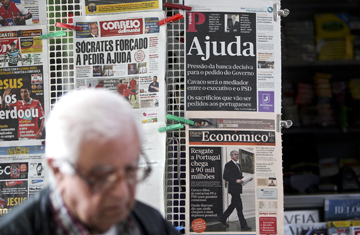
A man stands in front of a newspaper shop in front of the headlines of the Portuguese press in downtown Lisbon on April 7, 2011.
For Portugal, the news just gets worse and worse. Markets had been circling the debt-ridden, growth-resistant country since last summer, pushing up borrowing costs in anticipation of a default. Last month, the center-left government of Prime Minister José Sócrates collapsed after it failed to secure parliamentary backing for a raft of spending cuts and tax hikes. Last week, after long denying it needed any help, Sócrates' outgoing administration admitted defeat and sought a European Union bailout. And at a meeting of E.U. finance ministers on Friday and Saturday, Portugal was told: you can have your bailout — an estimated €80 billion ($116 billion) loan — but only if you agree to cuts that go beyond those that just brought down your government.
Portugal is now the third country in the euro zone to seek help after last year's multi-billion-euro rescue packages for Greece and Ireland from the E.U. and the International Monetary Fund (IMF). E.U. Economic and Financial Affairs Commissioner Olli Rehn said on Friday that the deal would be a "fully-fledged, most likely three-year program" with "strict conditionality." He said the austerity measures recently rejected by the Portuguese parliament were a "starting point" for an "ambitious privatization program" that would curb centralized wage setting, sell state assets like banks and utilities, and reform labor markets to make it easier to hire and fire.
The aim, Rehn said, was to reach a "cross-party" agreement, involving Portugal's outgoing government and opposition, thus heading off concerns about the legitimacy of any program signed off by a caretaker government. Such an accord would be concluded by mid-May, so it could then be put into place by the government that takes over after Portugal's June 5 elections. That might be an unpalatable prospect for the country's testy politicians, especially since it involves the IMF, whose austerity demands during the 1980s still scar the country's collective memory. But the main parties have at least already agreed on some key issues, like slashing the budget deficit from the current 8.6% of gross domestic product to 4.2% in 2012 and 2% in 2013.
Yet in the longer term, there are deeper questions about whether the bailout — coupled with the new austerity program — can turn Portugal around. Certainly, Portugal needs the loan to manage its debts, which have already reached more than 90% of GDP. But Portugal's problem is less about liquidity than long-term solvency. Its growth rate has been below 1% a year for the past decade, and the economy is predicted to shrink this year by 1%. Its economy depends heavily on traditional craft industries, and has failed to adapt to changing times. A lack of competitiveness is likely to ensure the debt burden remains high.
A wider issue is whether Portugal's bailout can contain the crisis that has dogged the euro zone for over a year. Attention has turned to Spain, where unemployment is over 20% and growing, and whose regional banks, the cajas, were badly exposed by the country's collapsed property market. Prime Minister José Luis Rodríguez Zapatero — who announced on April 2 that he is not standing for re-election — has taken steps to shore up public finances and open up the economy, recently launching major labor, pension and banking reforms. The markets seem to have given Spain the benefit of the doubt, prompting Spanish finance minister, Elena Salgado, to say on April 7 that she "absolutely ruled out" risk of contagion.
But if Spain is immune, others are not. Greece, the first euro-zone country to receive a bailout, may need saving again. Its debts are so massive that they may never be paid back. Many analysts say that even with a second bailout, Greece could still default. Elsewhere, Ireland's newly elected government says it plans to "renegotiate" the rescue deal reached last November, a move that could mean defaulting on holders of bank debts.
"The contagion risks have not been eradicated," says Silvio Peruzzo, a London-based analyst at the Royal Bank of Scotland. "Countries with high private and sovereign debt will remain at the mercy of further loss in market confidence."
Recently, a British newspaper reported that Portugal's star soccer player, Cristiano Ronaldo, would be sold to Spain for €160 million ($231 million) to pay off some of the national debt. It was an April Fools' Day prank — but Portugal and other vulnerable euro-zone countries may have to consider all sorts of radical remedies if they are ever to recover properly from this crisis.
